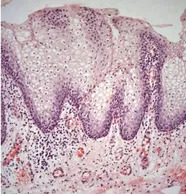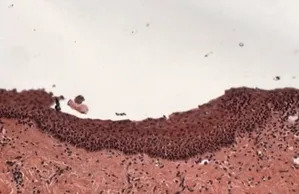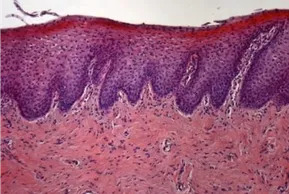Genitourinary Syndrome of Menopause (GSM)
Fractional CO2 Vaginal Laser Therapy
Tissue Changes After CO2 Laser Therapy
Premenopausal Vaginal Tissue

This is a slide of typical premenopausal tissue. Things to notice are thickness of epidermis (top lighter part) and rete pegs (the areas that project into lower tissue)
Postmenopausal Vaginal Tissue

Notice the thin epidermis (top darker layer) and loss of rete pegs (loss of those extensions down into tissue) that comes with menopause.
After CO2 Laser Therapy

Notice how after fractional CO2 laser therapy there is a return to thicker epidermis (top part) and return of rete pegs (the extensions down into tissue from epidermis).

PATIENT FEEDBACK
“The office staff is professional and caring. Dr. Epstein takes time to educate and explain tests and procedures. He listens to his patient’s concerns and answers questions thoroughly. He is an excellent surgeon and one I would highly recommend.”
“Dr Epstein is awesome. He has a great bedside manner and cares about his patients. He takes extra time to answer your questions and makes the most anxious patients (me) feel at ease. Surgery was a huge success and the recovery was honestly short and easy. The office staff is super helpful and sweet and Kristen went over and above to help with scheduling, insurance and coordinating all the moving parts. Thank you so much for a great experience!”
“This is by far one of the best doctors that I have ever had in my life and I am 60. I would recommend him to my most loved family members and anyone else that needed his services.”
Why Choose Us
At First Coast Urogynecology we are committed to improving the lives of our patient’s every day. We understand improving our patient’s quality of life comes not only from treating disease but also increasing pelvic floor wellness through education, therapy, and encouragement.
How We Can Help You
Dr. Epstein and his staff have been focused on helping women with pelvic floor disorders for over a decade. Let us help you achieve your goals.
Experience the Difference
We take pride in the quality of care we provide at First Coast Urogynecology. Experience the difference that a subspecialty center with a strong patient centered approach to care can provide.


